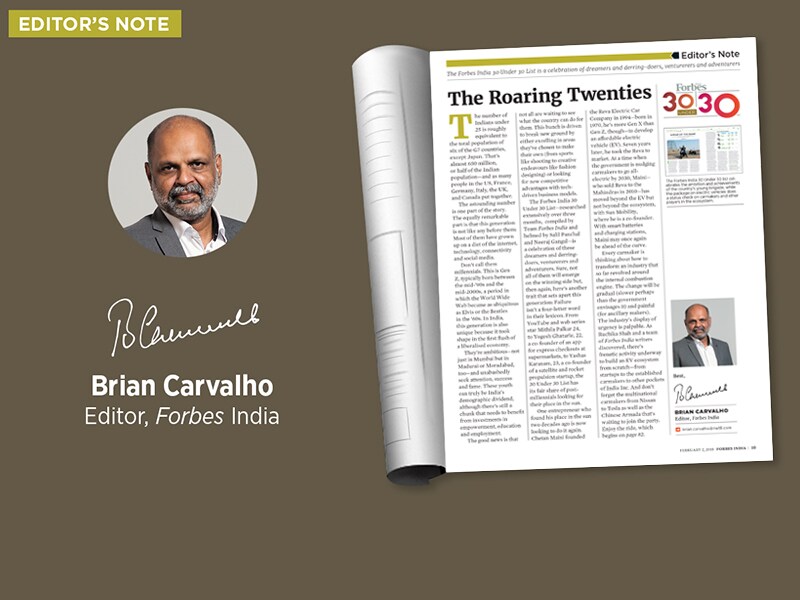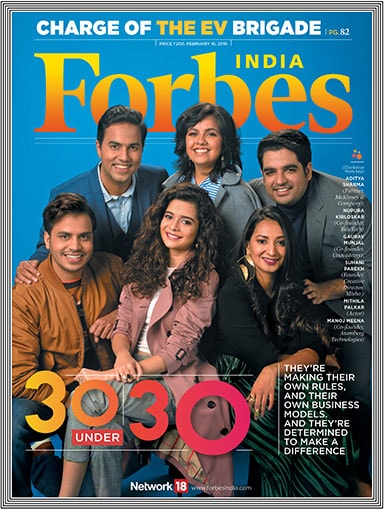The roaring twenties, and dreamers and derring-doers
The Forbes India 30 Under 30 List is a celebration of dreamers and derring-doers, venturerers and adventurers


The number of Indians under 25 is roughly equivalent to the total population of six of the G7 countries, except Japan. That’s almost 650 million, or half of the Indian population—and as many people in the US, France, Germany, Italy, the UK, and Canada put together.
The astounding number is one part of the story. The equally remarkable part is that this generation is not like any before them: Most of them have grown up on a diet of the internet, technology, connectivity and social media.Don’t call them millennials. This is Gen Z, typically born between the mid-’90s and the mid-2000s, a period in which the World Wide Web became as ubiquitous as Elvis or the Beatles in the ’60s. In India, this generation is also unique because it took shape in the first flush of a liberalised economy.
They’re ambitious—not just in Mumbai but in Madurai or Moradabad, too—and unabashedly seek attention, success and fame. These youth can truly be India’s demographic dividend, although there’s still a chunk that needs to benefit from investments in empowerment, education and employment.
The good news is that not all are waiting to see what the country can do for them. This bunch is driven to break new ground by either excelling in areas they’ve chosen to make their own (from sports like shooting to creative endeavours like fashion designing) or looking for new competitive advantages with tech-driven business models.
The Forbes India 30 Under 30 List —researched extensively over three months, compiled by Team Forbes India and helmed by Salil Panchal and Neeraj Gangal—is a celebration of these dreamers and derring-doers, venturers and adventurers. Sure, not all of them will emerge on the winning side but, then again, here’s another trait that sets apart this generation: Failure isn’t a four-letter word in their lexicon. From YouTube and web series star Mithila Palkar, 24, to Yogesh Ghaturle, 22, a co-founder of an app for express checkouts at supermarkets, to Yashas Karanam, 23, a co-founder of a satellite and rocket propulsion startup, the 30 Under 30 List has its fair share of post-millennials looking for their place in the sun.
One entrepreneur who found his place in the sun two decades ago is now looking to do it again. Chetan Maini founded the Reva Electric Car Company in 1994—born in 1970, he’s more Gen X than Gen Z, though—to develop an affordable electric vehicle (EV). Seven years later, he took the Reva to market. At a time when the government is nudging carmakers to go all-electric by 2030, Maini—who sold Reva to the Mahindras in 2010—has moved beyond the EV but not beyond the ecosystem, with Sun Mobility, where he is a co-founder. With smart batteries and charging stations, Maini may once again be ahead of the curve.
Every carmaker is thinking about how to transform an industry that so far revolved around the internal combustion engine. The change will be gradual (slower perhaps than the government envisages it) and painful (for ancillary makers). The industry’s display of urgency is palpable. As Ruchika Shah and a team of Forbes India writers discovered, there’s frenetic activity underway to build an EV ecosystem from scratch—from startups to the established carmakers to other pockets of India Inc. And don’t forget the multinational carmakers from Nissan to Tesla as well as the Chinese Armada that’s waiting to join the party. Enjoy the ride, which begins.
Best,
Brian Carvalho
Editor, Forbes India
Email:Brian.Carvalho@nw18.com
Twitter id:@Brianc_Ed
First Published: Feb 02, 2018, 07:26
Subscribe Now
